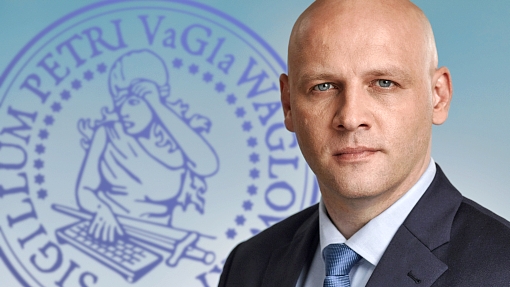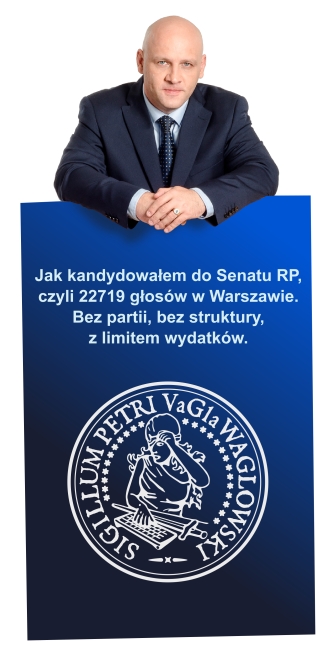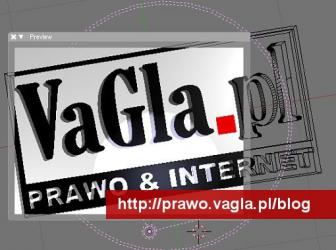Agenda Cyfrowa dla Europy...
- biznes
- państwo
- ue
- accessibility
- bazy danych
- bezpieczeństwo
- dane osobowe
- dostępność
- e-government
- edukacja
- faktury elektroniczne
- handel
- informatyzacja
- konkurencja
- konsumenci
- legislacja
- media
- prawa człowieka
- prawo autorskie
- prywatność
- przechowywanie danych
- re-use
- reklama i marketing
- retencja danych
- społeczeństwo
- sprzęt
- standardy
- tajemnice
- telekomunikacja
- wolność słowa
- własność intelektualna
- zamówienia publiczne
- ważne
 Sam nie wiem, co myśleć. Komisja Europejska przedstawiła "zarys planu działań", zwanego też "ambitną europejską agendą cyfrową". Dookoła zbyt wiele sprzecznych interesów, by dało sie je wszystkie pogodzić. Jeśli więc mamy zamiar zwiększać "zaufanie i bezpieczeństwo", co może się odbywać na przykład - to tylko moje dywagacje - przez powszechny monitoring obywateli Unii, to - siłą rzeczy - ucierpi prywatność. Prywatność w Agendzie Cyfrowej nie jest jednym z głównych, eksponowanych elementów, chociaż o prywatności słów parę można w opublikowanym dokumencie znaleźć. Jeśli gdzieś ktoś zabiega o innowacyjność, to zwykle pojawiają się postulaty zaostrzenia praw własności intelektualnej. Udział Unii Europejskiej w negocjacjach porozumienia ACTA nie został dostrzeżony, ale mam pewne podejrzenie, gdzie ten temat "ukryto" w agendzie. Kontrowersje pewnie wzbudzą "otwarte standardy", które wraz z europejską dyskusją stają się coraz mniej otwarte. Wydaje się, że nie da się jednocześnie mieć ciastka i go zjeść.
Sam nie wiem, co myśleć. Komisja Europejska przedstawiła "zarys planu działań", zwanego też "ambitną europejską agendą cyfrową". Dookoła zbyt wiele sprzecznych interesów, by dało sie je wszystkie pogodzić. Jeśli więc mamy zamiar zwiększać "zaufanie i bezpieczeństwo", co może się odbywać na przykład - to tylko moje dywagacje - przez powszechny monitoring obywateli Unii, to - siłą rzeczy - ucierpi prywatność. Prywatność w Agendzie Cyfrowej nie jest jednym z głównych, eksponowanych elementów, chociaż o prywatności słów parę można w opublikowanym dokumencie znaleźć. Jeśli gdzieś ktoś zabiega o innowacyjność, to zwykle pojawiają się postulaty zaostrzenia praw własności intelektualnej. Udział Unii Europejskiej w negocjacjach porozumienia ACTA nie został dostrzeżony, ale mam pewne podejrzenie, gdzie ten temat "ukryto" w agendzie. Kontrowersje pewnie wzbudzą "otwarte standardy", które wraz z europejską dyskusją stają się coraz mniej otwarte. Wydaje się, że nie da się jednocześnie mieć ciastka i go zjeść.
W każdym razie opublikowano dokument COMMUNICATION FROM THE COMMISSION TO THE EUROPEAN PARLIAMENT, THE COUNCIL, THE EUROPEAN ECONOMIC AND SOCIAL COMMITTEE AND THE COMMITTEE OF THE REGIONS A Digital Agenda for Europe (PDF). Nie widzę nigdzie polskiej wersji językowej, a porównanie takich wersji czasem daje wiele nowych przemyśleń. Być może zostanie kiedyś opublikowana na dedykowanej stronie (chociaż na razie są tam niemiecka, angielska i francuska wersja językowa). Opublikowano za to komunikat Agenda cyfrowa: Komisja przedstawia zarys planu działań na rzecz pobudzenia koniunktury i zwiększenia dobrobytu w Europie, a tam m.in. czytamy:
Realizacja ambitnej Europejskiej agendy cyfrowej, zaprezentowanej w dniu dzisiejszym przez Komisję Europejską, ma się znacząco przyczynić do wzrostu gospodarki UE oraz przynieść korzyści wynikające z epoki cyfrowej wszystkim grupom społecznym. Połowa wzrostu produkcyjności odnotowanego w Europie w ciągu ostatnich 15 lat wynika z wykorzystania technologii informacyjno-komunikacyjnych (zob. IP/10/571), a tendencja ta będzie się prawdopodobnie nasilać. W agendzie określono siedem priorytetowych obszarów działania: stworzenie jednolitego rynku cyfrowego, wzmocnienie interoperacyjności, zwiększenie zaufania do internetu i bezpieczeństwa prowadzonych w nim operacji, zapewnienie dostępu do znacznie szybszego internetu, wzrost nakładów na badania naukowe i rozwój, poprawa umiejętności informatycznych i zwiększenie włączenia cyfrowego oraz wykorzystanie technologii informacyjno-komunikacyjnych w celu sprostania stojącym przed nami wyzwaniom, takim jak zmiany klimatu czy starzenie się społeczeństwa. Przykładowe korzyści obejmują ułatwienia w płatnościach i fakturach elektronicznych oraz szybkie wdrożenie telemedycyny i energooszczędnego oświetlenia. We wspomnianych siedmiu obszarach przewiduje się podjęcie w ramach agendy cyfrowej ok. 100 działań, w tym 31 działań o charakterze legislacyjnym. Agenda cyfrowa to pierwsza z siedmiu flagowych inicjatyw realizowanych w ramach strategii Europa 2020 na rzecz inteligentnego i zrównoważonego rozwoju sprzyjającego włączeniu społecznemu (zob. IP/10/225).
„Na pierwszym planie rewolucji cyfrowej musimy postawić interes obywateli i przedsiębiorców europejskich i w ten sposób optymalnie wykorzystać potencjał zawarty w technologiach informacyjno-komunikacyjnych (TIK) do tworzenia miejsc pracy, zrównoważonego rozwoju i włączenia społecznego", powiedziała Neelie Kroes, wiceprzewodnicząca Komisji odpowiedzialna za realizację agendy cyfrowej. „Przedstawiona w dniu dzisiejszym ambitna strategia wyraźnie pokazuje, na czym musimy skupić nasze wysiłki w nadchodzących latach. Do pełnego wykorzystania potencjału związanego z cyfrową przyszłością Europy potrzebujemy całkowitego zaangażowania państw członkowskich, sektora TIK i innych kluczowych podmiotów gospodarczych.”
(...)
Potem wymieniono "Siedem celów", a wśród nich: Nowy jednolity rynek przyniesie korzyści wynikające z epoki cyfrowej, Poprawa w zakresie tworzenia standardów TIK oraz interoperacyjności, Zwiększenie zaufania i bezpieczeństwa, Zwiększenie dostępu Europejczyków do szybkiego i bardzo szybkiego internetu, Pobudzanie pionierskich badań i innowacji w sektorze TIK, Zapewnienie wszystkim Europejczykom umiejętności informatycznych oraz dostępności usług internetowych, Uwolnienie potencjału TIK z korzyścią dla społeczeństwa.
Gdy sobie przypomnę niedawną, burzliwą dyskusję na temat Pakietu telekomunikacyjnego, to myślę sobie, że programowanie strategiczne sobie, a co potem z tego wychodzi, to już zupełnie inna kwestia. W tym sensie podchodzę do tego typu dokumentów strategicznych z pewnym dystansem.
Agenda cyfrowa jest już komentowana. Polecam uwadze Szanownych Czytelników tekst w Dzienniku Internautów, zatytułowany Agenda Cyfrowa ciekawa, ale bez otwartych standardów. Tam też wskazywany jest komentarz francuskiej grupy La Quadrature du Net: Digital Agenda: Caution required for the future EU Net policies. Wcześniej Dziennik Internautów cytował materiały ujawnione przez francuski serwis PC INpact, który porównywał kolejne odsłony projektów Cyfrowej Agendy i na tej podstawie usiłował formułować tezy na temat kierunku, którym postępują prace nad dokumentem (wyszło z tych analiz, że z Agendy Cyfrowej stopniowo znikają otwarte standardy).
Oczywiście w Sieci jest znacznie więcej komentarzy:
- BBC: Europe outlines plan to boost broadband by 2020
- ZDNet UK: European IT workers to use standardised CV system
- The Canadian Press: European Union unveils "digital agenda" to increase use of online services, communication
- Wall Street Journal: EU Digital Plan Wants Faster Broadband For Europe-Draft
- EUobserver: Brussels rolls out 10-year internet masterplan
- eGov monitor: Digital Europe: New Action Plan Aimed At Delivering Inclusive Digital Society Launched By European Commission
- EurActiv: EU unveils five-year digital economy plan
To tylko niektóre z licznych materiałów, jakie opublikowano od wczoraj w Sieci. Część powiela notatkę prasową Komisji, ale część usiłuje już analizować treść 42 stronicowego dokumentu. A oto jego spis treści:
1. Introduction ..... 3
2. The action areas of the Digital Agenda ..... 7
2.1. A vibrant digital single market ..... 7
2.2. Interoperability and standards ..... 14
2.3. Trust and security ..... 16
2.4. Fast and ultra fast internet access ..... 18
2.5. Research and innovation ..... 21
2.6. Enhancing digital literacy, skills and inclusion ..... 24
2.7. ICT-enabled benefits for EU society ..... 27
2.8. International aspects of the Digital Agenda ..... 33
3. Implementation and governance ..... 35
W sferze "otwarcia treści" (a więc w sferze m.in. prawa autorskiego), a tu również mowa o ponownym wykorzystaniu informacji z sektora publicznego, Komisja proponuje:
Key Action 1: Simplify copyright clearance, management and cross-border licensing by
• Enhancing the governance, transparency and pan European licensing for (online) rights management by proposing a framework Directive on
collective rights management by 2010;
• Create a legal framework to facilitate the digitisation and dissemination of cultural works in Europe by proposing a Directive on orphan works by 2010, to conduct a dialogue with stakeholders with a view to further measures on out-of print works, complemented by rights information databases;
• By 2012, review the Directive on Re-Use of Public Sector Information, notably its scope and principles on charging for access and use;• Other actions:
• After an extensive stakeholder dialogue, report by 2012 on the need for additional measures beyond collective rights management allowing EU citizens, online content services providers and right-holders to benefit from the full potential of the digital internal market, including measures to promote cross-border and pan-European licenses, without excluding or favouring at this stage any possible legal option;
• In preparation thereof, issue a Green Paper addressing the opportunities and challenges of online distribution of audiovisual works and other creative content by 2010;
• On the basis of the review of the Directive on the enforcement of intellectual property rights, and following extensive stakeholder dialogue, report by 2012
on the need for additional measures to reinforce the protection against persistent violations of intellectual property rights in the online environment, consistent with the guarantees provided in the Telecoms Framework and fundamental rights on data protection and privacy.
W sferze marketingu i handlu elektronicznego Komisja proponuje:
• Key Action 2: Ensure the completion of the Single Euro Payment Area (SEPA), eventually by binding legal measures fixing an end date for migration before 2010 and facilitate the emergence of an interoperable European eInvoicing framework through a Communication on eInvoicing and by establishing a multistakeholder forum;
• Key Action 3: In 2011 propose a revision of the eSignature Directive with a view to provide a legal framework for cross-border recognition and interoperability of secure eAuthentication systems;
• Other actions:
• Evaluate by end 2010 the impact of the e-Commerce Directive on online markets and make concrete proposals.Member States should:
• Implement swiftly and coherently the key Directives supporting the digital single market, including the Services Directive, Unfair Commercial Practices Directive and the Telecoms Framework;
• Transpose by 2013 the VAT Directive ensuring equal treatment for eInvoicing with paper invoices.
W sferze budowania "digital confidence" (czyli jakby prywatności i zaufania) Komisja proponuje:
Key Action 4 Review the EU data protection regulatory framework with a view to enhancing individuals' confidence and strengthening their rights, by the end of 2010;
• Other actions:
• Propose by 2012 an optional contract law instrument complementing the Consumer Rights Directive to overcome the fragmentation of contract law, in particular as regards the online environment;
• Explore by 2011, via a Green Paper, initiatives on consumer Alternative Dispute Resolution in the EU with a view to making proposals for an EU-wide Online Dispute Resolution system for eCommerce transactions by 2012;
• Explore proposals in the field of collective redress, based on stakeholder consultation;
• Issue a Code of EU Online Rights by 2012 that summarises existing digital user rights in the EU in a clear and accessible way, complemented by an annual sweep of breaches of online consumer protection law and appropriate enforcement measures, in coordination with the European Network of Consumer Protection Agencies;
• Create a stakeholder platform by 2012 for EU online trustmarks, notably for retail websites.
W sferze budowania jednolitego wspólnego rynku telekomunikacyjnego:
• Propose measures for an increased harmonisation of numbering resources for provision of business services across Europe by 2011;
• On the basis of the European Radio Spectrum Policy Programme, coordinate the technical and regulatory conditions applying to spectrum use and, where necessary, harmonise spectrum bands to create economies of scale in equipment markets and allow consumers to use the same equipment and avail themselves of the same services across the EU;
• Conduct by 2011 an investigation into the cost of non-Europe in telecommunication markets to take further measures to reinforce the benefits of the single market.
W zakresie standardów i interoperacyjności Komisja proponuje:
• Key Action 5: As part of the review of EU standardisation policy, propose legal measures on ICT interoperability by 2010 to reform the rules on implementation of ICT standards in Europe to allow use of certain ICT fora and consortia standards;
• Other actions:
• Promote appropriate rules for essential intellectual property rights and licensing conditions in standard-setting, including for ex-ante disclosure, in particular through guidelines by 2011;
• Issue a Communication in 2011 to provide guidance on the link between ICT standardisation and public procurement to help public authorities to use standards to promote efficiency and reduce lock-in;
• Promote interoperability by adopting in 2010 a European Interoperability Strategy and European Interoperability Framework;
• Examine the feasibility of measures that could lead significant market players to license interoperability information to report by 2012.Member States should:
• Apply the European Interoperability Framework at national level by 2013;
• Implement commitments on interoperability and standards in the Malmö and Granada Declarations by 2013.
W zakresie bezpieczeństwa i budowy zaufania Komisja proponuje:
• Key Action 6: Present in 2010 measures aiming at a reinforced and high level Network and Information Security Policy, including legislative initiatives such as a modernised European Network and Information Security Agency (ENISA), and measures allowing faster reactions in the event of cyber attacks, including a CERT for the EU institutions;
• Key Action 7: Present measures, including legislative initiatives, to combat cyber attacks against information systems by 2010, and related rules on jurisdiction in cyberspace at European and international levels by 2013;• Other actions:
• Establish a European cybercrime platform by 2012;
• Examine the feasibility by 2011 to create a European cybercrime centre;
• Work with global stakeholders notably to strengthen global risk management in the digital and in the physical sphere and conduct internationally coordinated targeted actions against computer-based crime and security attacks;
• Support EU-wide cyber-security preparedness exercises, from 2010;
• As part of the modernisation of the EU personal data protection regulatory framework25 to make it more coherent and legally certain, explore the extension of security breach notification provisions;
• Give guidance by 2011 for the implementation of new Telecoms Framework with regard to the protection of individuals' privacy and personal data;
• Support reporting points for illegal content online (hotlines) and awareness campaigns on online safety for children run at national level and enhance pan-European cooperation and sharing of best practice in this field;
• Foster multi-stakeholder dialogue and self-regulation of European and global service providers (e.g. social networking platforms, mobile communications providers), especially as regards use of their services by minors.Member States should:
• Establish by 2012 a well-functioning network of CERTs at national level covering all of Europe;
• In cooperation with the Commission carry out large scale attack simulation and test mitigation strategies as of 2010;
• Fully implement hotlines for reporting offensive or harmful online content, organise awareness raising campaigns on online safety for children, and offer teaching online safety in schools, and encourage providers of online services to implement selfregulatory measures regarding online safety for children by 2013;
• Set up or adapt national alert platforms to the Europol cybercrime platform, by 2012, starting in 2010.
W zakresie urywającego głowę ze względu na szybkość dostępu do internetu Komisja proponuje:
• Key Action 8: Adopt in 2010 a Broadband Communication that lays out a common framework for actions at EU and Member State to meet the Europe 2020 broadband targets, including:
• Reinforce and rationalise, in this framework, the funding of high-speed broadband through EU instruments (e.g. ERDF, ERDP, EAFRD, TEN, CIP) by 2014 and explore how to attract capital for broadband investments through credit enhancement (backed by the EIB and EU funds);
• Propose an ambitious European Spectrum Policy Programme in 2010 for decision by the European Parliament and the Council that will create a coordinated and strategic spectrum policy at EU level in order increase the efficiency of radio spectrum management and maximise the benefits for consumers and industry;
• Issue a Recommendation in 2010 to encourage investment in competitive Next Generation Access networks through clear and effective regulatory measures.Member States should:
• Develop and make operational national broadband plans by 2012 that meet the coverage and speed and take-up targets defined in Europe 2020, using public financing in line with EU competition and state aid rules28, the Commission will report annually on progress as part of the Digital Agenda governance;
• Take measures, including legal provisions, to facilitate broadband investment, such as making sure that civil engineering works systematically involve potential investors, clearing rights of way, mapping available passive infrastructure suitable for cabling and
upgrading in-building wiring;
• Use fully the Structural and Rural Development Funds that are already earmarked for investment in ICT infrastructures and services;
• Implement the European Spectrum Policy Programme, so as to ensure the coordinated allocation of the spectrum needed to meet the target of 100% coverage of 30mbps internet by 2020, and the NGA Recommendation.
W zakresie rozwijania wszechpotężnej innowacyjności Komisja proponuje:
• Key action 9: Leverage more private investment through the strategic use of precommercial procurement and public-private partnerships, by using structural funds for research and innovation and by maintaining a pace of 20% yearly increase of the ICT R&D budget at least for the duration of FP7;
• Other actions:
• Reinforce the coordination and pooling of resources with Member States and industry, and put greater focus on demand- and user-driven partnerships in EU support to ICT research and innovation;
• Starting in 2011 propose measures for ‘light and fast’ access to EU research funds in ICT, making them more attractive notably to SMEs and young researchers in view of a wider implementation within the revision of the EU RTD Framework;
• Ensure sufficient financial support to joint ICT research infrastructures and innovation clusters, develop further eInfrastructures and establish an EU strategy for cloud computing notably for government and science;
• Work with stakeholders to develop a new generation of web-based applications and services, including for multilingual content and services, by supporting standards and open platforms through EU-funded programmes.Member States should:
• By 2020, double annual total public spending on ICT research and development spending from €5.5bn to €11bn (which includes EU programmes), in ways that leverage an equivalent increase in private spending from € 35 billion to € 70 billion;
• Engage in large scale pilots to test and develop innovative and interoperable solutions in areas of public interest that are financed by the CIP.
W bardzo ważnej kwestii, jaką jest - jak uważam - edukacja medialna, a także w sprawach związanych z ułatwieniami w dostępności, Komisja proponuje:
• Key Action 10: Propose digital literacy and competences as a priority for the European Social Fund regulation (2014-2020);
• Key Action 11: By 2012, develop tools to identify and recognise the competences of ICT practitioners and users, linked to the European Qualifications Framework and to EUROPASS and develop a European Framework for ICT Professionalism to increase the competences and the mobility of ICT practitioners across Europe;• Other actions:
• Make digital literacy and skills a priority of the "New skills for new jobs" Flagship to be launched in 2010, including the launch of a multi-stakeholder sectoral council for ICT skills and employment to address demand and supply aspects;
• Promote a higher participation of young women and women returners in the ICT workforce through support for web-based training resources, game based eLearning and social networking;
• Develop in 2011 an online consumer education tool on new media technologies (e.g. consumer rights on the internet, eCommerce, data
protection, media literacy, social networks etc.). This tool will provide customised information and education materials for consumers, teachers and other multipliers in the 27 Member States;
• Propose by 2013 EU-wide indicators of digital competences and media literacy;
• Systematically evaluate accessibility in revisions of legislation undertaken under the Digital Agenda, e.g. eCommerce, eIdentity & eSignature, following the UN Convention on the Rights of Persons with Disabilities;
• Based on a review of options, make proposals by 2011 that will make sure that
public sector websites (and websites providing basic services to citizens) are
fully accessible by 2015;
• Facilitate by 2012, in cooperation with Member States and relevant stakeholders, a Memorandum of Understanding on Digital Access for
persons with disabilities in compliance with the UN Convention.Member States should:
• Implement by 2011 long-term e-skills and digital literacy policies and promote relevant incentives for SMEs and disadvantaged groups;
• Implement by 2011 the provisions on disability in the Telecoms Framework and the Audiovisual Media Services Directive;
• Mainstream eLearning in national policies for the modernisation of education and training, including in curricula, assessment of learning outcomes and the professional development of teachers and trainers.
W sferze rozwoju rynku ICT, a w szczególności publiczno-prywatnej współpracy między rynkiem i instytucjami publicznymi, Komisja proponuje:
• Key Action 12: Assess by 2011 whether the ICT sector has complied with the timeline to adopt common measurement methodologies for the sector's own energy performance and greenhouse gas emissions and propose legal measures if appropriate;
• Other actions:
• Support partnerships between the ICT sector and major emitting sectors (e.g. buildings and construction, transport and logistics, energy distribution) to improve the energy efficiency and greenhouse gas emissions of these sectors by 2013;
• Assess by 2011 the potential contribution of smart grids to the decarbonisation of energy supply in Europe and define a set of minimum functionalities to promote the interoperability of Smart Grids at European level by the end of 2010;
• In 2011 publish a Green Paper on Solid State Lighting (SSL) to explore the barriers and to put forward policy suggestions; it will in parallel support demonstration projects using the CIP.Member States should:
• Agree by the end of 2011 common additional functionalities for smart meters;
• By 2012 include specifications for total lifetime costs (rather than initial purchase costs) for all public procurement of lighting installations).
Samodzielne życie i ochrona zdrowia!
The Commission will work with Member States competent authorities and all interested stakeholders to:
• Key Action 13: Undertake pilot actions to equip Europeans with secure online access to their medical health data by 2015 and to achieve by 2020 widespread deployment of telemedicine services;
• Key Action 14: Propose a recommendation defining a minimum common set of patient data for interoperability of patient records to be accessed or exchanged electronically across Member States by 201256;• Other actions:
• Foster EU-wide standards57, interoperability testing and certification of eHealth systems by 2015 through stakeholder dialogue;
• Reinforce the AmbientAssisted Living (AAL) Joint Programme to allow older people and persons with disabilities to live independently and be active in society.
Różnorodność kulturalna!, a tam Komisja proponuje:
• Key action 15: By 2012 propose a sustainable model for financing the EU public digital library Europeana and digitisation of content;
• Other actions:
• By 2012 propose measures following the results of the consultation on its Green Paper on "Unlocking the potential of cultural and creative industries";
• Issue by 2011 a Recommendation on promoting digitisation of European cinema;
• Ensure the implementation of the provisions of the Audiovisual Media Services Directive concerning cultural diversity, where appropriate through co- and self-regulation and request information from Member States on their application by the end of 2011.
Elektroniczna administracja! Tu Komisja proponuje:
• Key Action 16: Propose by 2012 a Council and Parliament Decision to ensure mutual recognition of e-identification and e-authentication across the EU based on online 'authentication services' to be offered in all Member States (which may use the most appropriate official citizen documents – issued by the public or the private sector);
• Other actions:
• Support seamless cross-border eGovernment services in the single market through the Competitiveness and Innovation Programme (CIP) and
Interoperability Solutions for European Public Administrations (ISA) Programme;
• Review by 2011 the Public access to Environmental Information Directive;
• Work with Member States and stakeholders to implement cross-border eEnvironment services, notably advanced sensor networks;
• Define by 2011 concrete steps in a White Paper on how to inter-connect eprocurement capacity across the single market;
• Lead by example on open and transparent eGovernment by creating in 2010 and implementing an ambitious eCommission 2011-2015 action plan, including full electronic procurement.Member States should:
• Make eGovernment services fully interoperable, overcoming organisational, technical or semantic barriers and supporting IPv6;
• Ensure that the Points of Single contact function as fully fledged eGovernment centres beyond requirements and areas covered by the Services Directive;
• Agree by 2011 on a common list of key cross-border public services that correspond to well defined needs – enabling entrepreneurs to set up and run a business anywhere in Europe independently of their original location, and allowing citizens to study, work, reside and retire anywhere in the European Union. These key services should be available online by 2015.
Wspanialsza mobilność i poprawa możliwości w zakresie transportu:
• Increase the speed of ITS take-up, in particular for road and urban transport by, applying the proposed ITS Directive in support of interoperability and rapid standardisation;
• By 2010, adopt the Air Traffic Management Solutions for the Single European Sky (SESAR) deployment strategy;
• Propose by 2011 a Directive for the deployment of e-Maritime services;
• Propose in 2011 a Directive setting out technical specifications for telematic applications for rail passenger services.Member States should:
• Fulfil their obligations under the European Rail Traffic Management System (ERTMS) deployment plan, in particular as regards the lines due to be equipped by 2015.
Cyfrowa Agenda w aspekcie międzynarodowym. Tu nie pada ani słowa na temat ACTA, ale Komisja proponuje:
The Commission will:
• Promote the internationalisation of internet governance and global cooperation to maintain the stability of the internet, on the basis of the multi-stakeholder model;
• Support the continuation of the Internet Governance Forum beyond 2010;
• Work with third countries to improve international trade conditions for digital goods and services, including with regard to intellectual property rights;
• Seek a mandate to update international agreements in line with technological progress or, where appropriate, propose new instruments.
Lepiej mieć program działania, niż go nie mieć. "Jest Pan kandydatem na urząd Prezydenta RP, co Pan myśli o nowej Agendzie Cyfrowej dla Europy, opublikowanej przez Komisję Europejską? Eeeeee..."
- Login to post comments
Piotr VaGla Waglowski

Piotr VaGla Waglowski - prawnik, publicysta i webmaster, autor serwisu VaGla.pl Prawo i Internet. Ukończył Aplikację Legislacyjną prowadzoną przez Rządowe Centrum Legislacji. Radca ministra w Departamencie Oceny Ryzyka Regulacyjnego a następnie w Departamencie Doskonalenia Regulacji Gospodarczych Ministerstwa Rozwoju. Felietonista miesięcznika "IT w Administracji" (wcześniej również felietonista miesięcznika "Gazeta Bankowa" i tygodnika "Wprost"). Uczestniczył w pracach Obywatelskiego Forum Legislacji, działającego przy Fundacji im. Stefana Batorego w ramach programu Odpowiedzialne Państwo. W 1995 założył pierwszą w internecie listę dyskusyjną na temat prawa w języku polskim, Członek Założyciel Internet Society Poland, pełnił funkcję Członka Zarządu ISOC Polska i Członka Rady Polskiej Izby Informatyki i Telekomunikacji. Był również członkiem Rady ds Cyfryzacji przy Ministrze Cyfryzacji i członkiem Rady Informatyzacji przy MSWiA, członkiem Zespołu ds. otwartych danych i zasobów przy Komitecie Rady Ministrów do spraw Cyfryzacji oraz Doradcą społecznym Prezesa Urzędu Komunikacji Elektronicznej ds. funkcjonowania rynku mediów w szczególności w zakresie neutralności sieci. W latach 2009-2014 Zastępca Przewodniczącego Rady Fundacji Nowoczesna Polska, w tym czasie był również Członkiem Rady Programowej Fundacji Panoptykon. Więcej >>








Flourishing digital economy
Nie wiem kto tam w KE pisze te teksty, ale fragment "Europe's strategy for a flourishing digital economy" brzmi niezwykle komicznie. Zwłaszcza jak się weźmie pod uwagę klapę Strategii Lizbońskiej.
Warto natomiast zwrócić uwagę na ranking w "country profiles" dołączonym do tego dokumenu.
Polska oscyluje tam na szarym końcu pod wieloma względami. W szczególności pod względem dostępności łącz Internetowych oraz - cóż za niespodzianka! - dostępności usług administracji publicznej przez Internet.
--
Paweł Krawczyk
IPSec.pl - Podpis elektroniczny i bezpieczeństwo IT
Polska wersja językowa Europejskiej Agendy Cyfrowej
Na stronach MSWiA opublikowano polski tekst Europejskiej Agendy Cyfrowej.
http://www.mswia.gov.pl/portal/pl/256/8488/Europejska_agenda_cyfrowa_przyjeta.html
W.Wiewiórowski